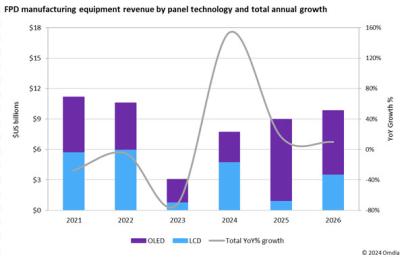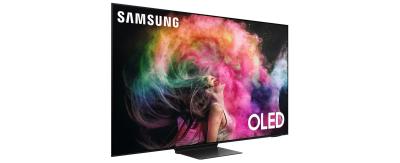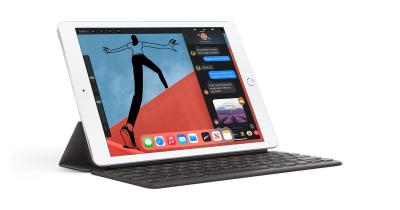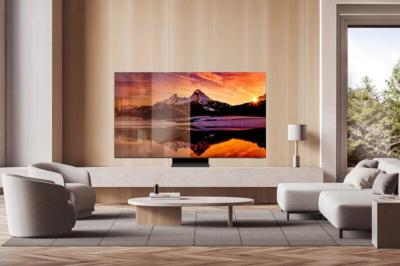Samsung announce a new Flex Magic Pixel technology for enhanced OLED privacy
Samsung Display demonstrated a new technology it brands as Flex Magic Pixel, that adjusts the viewing angle of the flexible OLED screen so that it is not visible to the person next to it. Samsung says that when this technology is combined with the proper AI technology, can be used to enhance the security of smart devices.
Samsung gives a use case example - when a smart device user runs a banking application in a public place, AI technology can automatically recognize the environment and initiate additional security features. The company's new Flex Magic Pixel enables the introduction of dynamic OLED privacy. Samsung Display is showing the new application at MWC 2024.
Samsung: we sold 1 million OLED TVs in 2023 and had a market share of 22.7% in the OLED TV market
Samsung announced that in 2023 it retained its market-leading position in the TV mraket, with a 30.1% market share (revenues). The company also disclosed that it sold 1.01 million OLED TVs in 2023 - mostly QD-OLED TVs, and some WOLED TVs as well.
Samsung quotes Omdia saying that it had a 22.7% market share in the OLED TV Market (by revenue), which is pretty impressive, as the company is relatively very new to this market.
Rumors say Huawei is readying a tri-folding OLED smartphone, and Samsung may respond with its first rollable phone
Interesting rumors from China suggest that Huawei is planning to release the industry's first smartphone that sports a tri-foldable OLED. When fully open, the device will sport a 10" display, which means it will double as a full tablet and a smartphone. Huawei's plan is to release it in the first half of 2024.
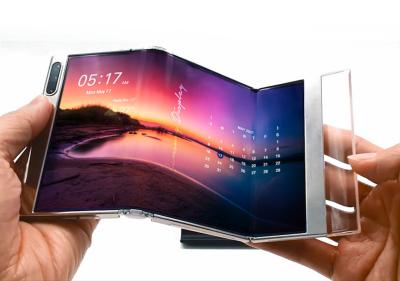
Samsung tri-folding AMOLED prototype
The rumors continue to suggest that Samsung Electronics noticed Huawei's plan, and the Korean smartphone maker may decide to be the first on the market with a novel device, launching its own tri-folding phone - or perhaps even the first rollable phone.
Samsung and LG to deepen their cooperation on OLED displays and other areas
Samsung and LG have a long history of rivalry, but recently the companies started a surprising collaboration in the OLED industry, when in 2023, Samsung launched its first OLED TV that used WOLED panels produced by LG Display, and recently the company signed a 5-year supply agreement with LGD.
According to recent reports from Korea, this is not an isolated case. The two Korean conglomerates have decided to increase their collaboration in order to increase their competitiveness against rivals, mostly from China. The two companies have formed a "TV alliance", of which the first step is by Samsung to adopt LGD's WOLED panels. LG Display, in return have agreed to use Samsung Display's AMOLED panels in its LG Gram laptop range. This was reported already last year, but we did not know it was part of Samsung's and LG's new strategy of cooperation.
Samsung researchers collaborate with the UK's NPL to better understand blue OLED degradation mechanisms
Researchers from the UK's National Physical Laboratory (NPL), together with the Samsung Advanced Institute of Technology (SAIT), released a new study to better understand the degradation of blue OLED devices.
Close-up of the OrbiSIMS instrument’s vacuum chamber showing the nozzles of the ion beams and electrode that extract ionised molecules for analysis (Picture credit: NPL)
The OLED degradation mechanisms that limit the lifetime of blue OLED emitters, whether physical, chemical or something else, are still not yet fully understood. Understanding the degradation mechanism of blue OLEDs is essential to improve their performance and stability. The NPL / SAIT team used OrbiSIMS, an innovative mass spectrometry imaging technique invented at NPL in 2017, to study OLED degradation.
Omdia sees a rebound in the display production equipment market
Market research firm Omdia says that display production equipment sales will rebound in 2024 and reach $7.7 billion (154% over 2023), and will grow slowly in the near future, mainly driven by 8.6-Gen OLED production lines (used to make IT displays).
Omdia says that the new 8.6-Gen OLED fab require novel technologies, which results in high equipment costs. In 2024, 32% of all spending ($2.4 billion) will be for Samsung's A6 line, a large investment for a 15,000 monthly subtrates fab. BOE's investment in its upcoming B16 flexible 8.6-Gen line will be even higher - by 18% due to the backplane choice (LTPO over Samsung's oxide-TFT A6).
Samsung Electronics signs a 5-year WOLED supply agreement with LG Display
In July 2023, Samsung Electronics officially launched the 83" 83S90C, the company's first TV to use LG's WOLED panels, following several years of negotiations and hesitation by the Korean rivals. Samsung then continued to launch more WOLED TVs, but did not made large orders, as it mainly uses QD-OLED panels from SDC for its high-end TVs.
According to a new report, Samsung Electronics has signed a five-year WOLED supply agreement with LG Display. This is an interesting development that may have implications for Samsung Display's QD-OLED production plans. We do not have more details, it will be interesting to learn what kind of volumes Samsung committed to.
Report says Apple reduced its OLED iPad Pro orders by 20-30% due to low expected demand
Earlier this month we reported that Samsung Display and LG Display have started to produce AMOLED displays for Apple's future iPads, to be announced later this year. Earlier expectations were for Apple to order a total of 10 million iPad AMOLED displays in 2024 from both LGD and SDC, with LGD getting around 60% of the orders.
According to a new report, Apple has decided to cut its order size by around 20-30%. Apple will be launching two OLED iPad Pro devices: 11" and 13", and the reduction in orders is for the 13" device, for which LGD is the exclusive supplier, which is why only LGD is effected by the new order cut.
Samsung and LG begin producing 11" and 13" tandem LTPO AMOLED displays for Apple's iPads
Reports from Korea suggest that Samsung Display and LG Display are starting to produce AMOLED displays for Apple's future iPads, to be announced later this year. Samsung is set to produce 11" LTPO AMOLED displays, while LG Display is producing displays for the 13" model (but LGD will also produce 11" AMOLEDs in the future for Apple).
The Elec says that both Korean makers developer 11" and 13" displays, but for some unknown reason only LGD will produce the 13" displays. This could change in the future, of course. One reason could be that LG Display has more experience with tandem OLED architectures (developed originally by LGD years ago for automotive OLEDs).
Samsung unveils its 2024 OLED TV lineup
Samsung Electronics announced its 2024 OLED TV lineup, with 3 series. The company's flagship OLED TV for 2024, the S95D, offers 55-, 65-, or 77-inch 4K 144hz QD-OLED panels, offering high brightness (up to 3000 nits peak brightness), a new anti-glare coating to minimize reflections, Tizen 8.0 OS, and an external One Connect box for a sleek design. The S95D offers AI-Enhanced color accuracy - validated by Pantone.
Samsung also announced two more series - S90D and S85D. Interestingly, it did not detail whether these TVs use QD-OLED (produced by SDC) or WOLED panels (produced by LGD) - or a mix as it did last year within the same series.
Pagination
- Previous page
- Page 8
- Next page




